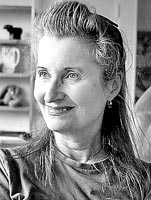
Internet connects reclusive Nobel laureate to readers, worldVIENNA, Austria (AP) - By some measures, Elfriede Jelinek's world is small. The reclusive Nobel literature laureate cloisters herself inside her homes in Vienna and Munich, Germany, and rarely ventures out in public. But online, the Austrian writer — who suffers from what she has described as a "social phobia" — connects with ease to people around the world. Little wonder, then, that she chose to debut her latest novel on the Web rather than in bookstores.
"I find the Internet to be the most wonderful thing there is," Jelinek said in an e-mail interview with The Associated Press. "It connects people. Everyone can have input." Jelinek, 60, has been posting chapters of the new book, "Neid" (German for "Envy"), as she writes them. The first two chapters of the work she describes as a "mixture of blog and prose" are already available on her site, www.elfriedejelinek.com, and there are more to come. "It's a wonderfully democratic method, publishing a text on the Internet," Jelinek told the AP. Although the German-language work will never appear in traditional book form and is primarily meant to be read on the screen, "anyone who wants to can download it or print it out," she said. Jelinek's affinity for cyberspace makes sense. In 2004, after she won the Nobel, she acknowledged she couldn't bring herself to travel to Stockholm, Sweden, to pick up her prize and the $1.3 million (euro970,000) check. She even asked Austria's post office to shelve plans to honor her, saying she was uncomfortable with the idea of her likeness on a stamp. The provocative and antiestablishment Jelinek - best known for 1983's "The Piano Teacher," which was adapted into an award-winning film in 2001, starring Isabelle Huppert - blames her reclusive lifestyle in part on life's disappointments and says contempt of her work has taken its toll. Over the years, her writings - including "Wonderful, Wonderful Times," "Women as Lovers" and "Lust" - have raised eyebrows. "Greed," her latest novel available in English translation, has received good reviews. But some critics consider her books too provocative and even pornographic. "My withdrawal is not just the result of a psychological illness I've had since childhood, but also partly the result of a disappointment about life," she said in a series of e-mails, some of which she playfully signed with a design of letters, numbers and punctuation that form the image of a pig. "The contempt also of my own work, that I felt over and over, incidentally also from women ... almost destroyed me as much as my illness," she said. Despite her withdrawal from public life, Jelinek said she knows enough people who like her and want to see her, and that she can always get together with others if she feels a desire to do so."As long as I have books and DVDs, I don't miss much," she said. Pia Janke, director of the Vienna-based Elfriede Jelinek Research Center, said she has noticed an increase in international curiosity about Jelinek in recent years."From the United States to South America and China - we get requests for material from around the world," Janke said. For the center's Peter Clar, Jelinek is one of a kind. "She has such a unique style. At the moment, I can't think of anyone who could replace her," Clar said, adding that Jelinek does not have a broad readership because of the complex and predominantly negative nature of her texts. Jelinek's latest play, "Ueber Tiere" ("About Animals"), premiered at Vienna's Burgtheater im Kasino this spring. It is based on an investigative report by a Vienna newspaper on how lawyers, diplomats and other professional men patronized an escort service in the Austrian capital, often paying high prices to live out their sexual fantasies with underage girls from Eastern Europe. The production, directed by Ruedi Haeusermann, consists in part of crude and explicit snippets of conversations between clients and a pimp taken from tapped telephone conversations. The sordid details are woven into a monologue delivered by an actress who shares the stage with a slew of pianos that musicians periodically play and move about the stage."In these escort agencies ... women's flesh is sold like a piece of pork or a pizza. Just like animal meat," Jelinek said. Jelinek said she believes in true and unconditional love between two people, but only if the two are equals. Her husband, Gottfried Huengsberg, who composed electronic music for some of German director Rainer Werner Fassbinder's films, lives in Munich. When asked how her life has changed since winning the Nobel, Jelinek said she can no longer move around as much because people recognize her. But there are benefits, too: The prize money has allowed her to try new things, such as her online novel, without being tied to a publisher for financial reasons."For me, that's a gift," she said. |
|| Front
Page | News | Editorial | Columns | Sports | Plus | Financial
Times | International | Mirror | TV
Times | Funday
Times || |
| |
Copyright
2007 Wijeya
Newspapers Ltd.Colombo. Sri Lanka. |
